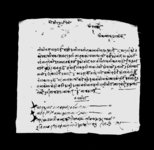A written statement by Ratanamāna Jyāpu, Āsāmāna Jyāpu and Sīva Bāhādura Nakarmī re the reassignment of the gambling license at the Asana market square (VS 1959)
ID: K_0499_0046
Edited and
translated by Simon Cubelic
in collaboration with
Rajan Khatiwoda
Created: 2015-09-28;
Last modified: 2023-01-25
For the metadata of the document, click here
The accompanying edition, translation/synopsis and/or commentary are available under the terms of the Creative Commons Attribution-ShareAlike 4.0 International License
Abstract
In this written statement Ratanamāna Jyāpu, Āsāmāna Jyāpu and Sīva Bāhādura Nakarmī declare that Meheramāna Nhuche Pradhāna won the tender for the gambling license for the market square at Asana for the years VS 1959-1961 (1902-1904 CE) for a sum of 40 moru per annum. According to the usual procedure, a notice with the name of the successful bidder has to be posted at the gate of the concerned office for seven days. During this period new bids can still be submitted. The three witnesses state further that a notice under Meheramāna Nhuche Pradhāna's name had been posted for six days but was blown away by the wind on the deadline day.Diplomatic edition
[1r]
श्री1श्रीअंनपुर्णादेवी2१1श्री५सर्कार
2३1श्रीकम्यांन्डरइनचीफ
2२⟪१४नं⟫1लिषीतम्ठाउठाऊवस्नेहामीतपसीलकामानीसहरूआगे¯ ¯ १¯कागुठीको४
2कील्लाभीत्रकाअसनदवुलीमाजुव़ाकोपासाथापीवर्षकोमोरु४०कादर्ले
3५९सालदेषी६१सालतकवर्ष३ कोमोरु१२०तीरूंलाभनीकाठमाडौटुंवाहाल
4वस्नेमेहेरमानन्हुछेप्रधानलेकवुलीनामालेषीदीयाकोहुनाले७दीनेम्याद
5तासी६दीन्कादीनउषाडी¯ ¯ २¯काहजुरमाजाहेरगरिवाकी१दीनेऐनवमोजीम
6नीजकानाउमा५९सालआश्वींवदि१३।३मातासीयाकोम्यादकोपुर्जिवतासले⟪उडाई⟫ह
7रायाकोसाचोहोभनिहामीहरूकामनोमानषुसीराजीसंगज्मान्वंदीमुचुल्का
8लेषीगुठीजाचअडामाफर्त्¯ ¯ ३¯माचढाञ्यूं¯¯¯¯¯¯¯¯¯¯¯¯¯¯¯
9तपसील
10पाटन्दुपाटटोलवस्न्यारतनमानज्यापु ¯¯¯¯¯¯¯¯¯¯¯¯¯¯¯१
11पाटन्ऐंऐंवस्न्याआसामानज्यापु ¯¯¯¯¯¯¯¯¯¯¯¯¯¯¯१
12सहरकाठमाडौकमराछीटोलवस्न्यासीववाहादुरनकर्मी ¯¯¯¯¯¯¯¯¯¯¯¯¯¯¯१
13इतिसम्वत्१९५९सालमितिआश्वीण१४रोज४शुभम् ¯¯¯¯¯¯¯¯¯¯¯¯¯¯¯
Translation
[1r]
Venerable Goddess Annapūrṇā 1
Venerable commander-in-chief 2
No. 141
The following has been written by us, the persons mentioned in the details [below], residing in separate places. Regarding [the following]: Meheramāna Nhuche Pradhāna, who lives in Ṭuṃ Bāhāla, Kathmandu, [earlier] wrote [the following] promissory note: "I will arrange for the dice for gambling at the Asana market square within the four boundaries of the guṭhī of -1- (i.e., Venerable Goddess Annapūrṇā) and pay 120 moru for three years from the year [19]59 to [19]61 at a rate of moru 40 per annum." A notice [to this effect] was posted for [the official] seven-day period. On the sixth day it was removed and -2- (i.e., commander-in-Chief) was informed of this [fact]. It is true that when one day was left on the fixed-period notice, which was posted on Tuesday, the 13th of the dark fortnight of Āśvina in the year [19]59, under the name of the above-mentioned person in accordance with the Ain, it was lost, having been blown away by the wind. We have of our own volition submitted a witnessed written statement (muculkā) [to this effect] to -3- (i.e., Śrī 5 Sarkāra) through the Guṭhī Jā̃ca Aḍḍā.
Details
Ratanamāna Jyāpu, residing in Dupāṭa Ṭola, Patan - - - 1
Āsāmāna Jyāpu, residing at the same place (i.e., Dupāṭa Ṭola), Patan - - -1
Sīva Bāhādura Nakarmī, residing in Kamarāchī Ṭola, the city of Kathmandu - - -1
On Wednesday, the 14th of Āśvina in the [Vikrama] era year 1959 (1902 CE). Auspiciousness.
Commentary
This document is one of a series of four documents in which the matter of concern is a recently concluded tender process for assigning the gambling license for the market square at Asana for the years VS 1959-1961 (cf. K_0499_0041, K_0499_0047, K_0499_0048). K_0499_0041 states that Meheramāna Nhuche Pradhāna at first won the tender. However, even though the official deadline had expired, a man by the name of Kularatna successfully filed a petition that led to a repetition of the tender process. In the end, the license was granted to Kularatna. The details surrounding the tender process ascertainable from this document mirror exactly the procedure prescribed by the Mulukī Ain of VS 1945 in the article "On Revenue Collection Arrangements" (rakam bandobastako), of which there is a translation by M.C. Regmi (Regmi 1980: 65-69). According to section 8 of this article of the Mulukī Ain, the name of the successful bidder for the contract had to be posted at the gate of the oversight offices and at two public places for seven days. On the sixth day, a report on the outcome of the tender process was to be prepared and forwarded to higher authorities—probably, as this document suggests, to the prime minister's office. After the seven-day deadline had expired and approval had been received from higher up, the contract could be handed over. Any deviation from this procedure rendered the tender process invalid, with the officer in charge being held legally responsible. The background of the present document is not entirely clear. Meheramāna Nhuche Pradhāna may have earlier tried to prove that the he had already won the tender for the sum of 40 moru and Kularatna's much higher bid was to be rejected for procedural reasons.

